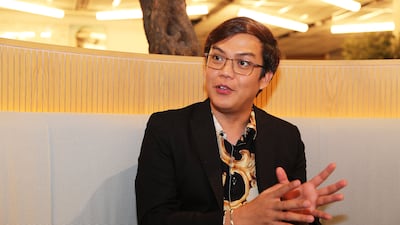A leading youth climate advocate said fossil fuel companies need to be part of climate talks if people want them to switch to renewable energy.
Jan Kairel Guillermo, youth engagement officer at the Water and Climate Coalition ― a collection of 10 UN agencies to tackle water and climate issues ― said that did not mean decarbonising the economy should be delayed but it needed to be a proper transition and one that involved major financing.
At a Cop28 event in Dubai on Wednesday, Mr Guillermo, 29, said the UAE’s hosting of the climate talks, while also being a major fossil fuel producer, sent a “signal of hope” that this change was possible.
“I tell friends in activism and advocacy that you shouldn’t be afraid,” Mr Guillermo said, because Cops are consensus based.
“To me, they [UAE] are giving a signal of hope the oil companies are willing to make this bold move.
“Some young activists don’t like my approach [and] say stop fossil fuels, but it can’t happen [immediately]. It is also a matter of economic stability. If we stop, how do we sustain the poor countries?” he said, while also adding that climate change caused by fossil fuels is also making countries poorer through disasters.
In a wide-ranging interview, Mr Guillermo reflected on the problem of “youth-washing”; his hopes for real change at Cop28 this year; and how he survived the devastating effects of Super Typhoon Yolanda in his native Philippines in 2013.
On the role of youth in tackling climate change, Mr Guillermo said “youthwashing” was a problem across the world. “[Companies or entities] like to put young people on the podium … for a photo opportunity ― and then that’s it.”
He said this had to change and he was also trying to drive a switch from youth just making demands at events such as Cop28 to seeking real commitments on youth policies, such as at next week’s UN Water Conference.
“We want to see policies: funding and opportunities for young people. We are talking about our future. We don’t want it to be just words. We have experienced that many times,” he said.
Mr Guillermo has served in key youth roles with the UN and, in 2021, was in charge of the global affairs unit of the Conference of Youth, a Cop for youngsters that takes place every year before the main summit. He said developing countries needed support and understanding on the path to a greener tomorrow.
“Go to developing countries: [the] thinking is OK there is climate change ― but what are we eating the next day?”
One of the few agreements from Cop27 in Egypt last year was the creation of a “loss and damage” fund to help developing countries deal with climate change. Who pays into it and other questions surrounding it are expected to be discussed at Cop28, which Mr Guillermo said was a positive step.
“Developing countries are really pushing,” he said. “We thought it wouldn’t get through as it is getting responsibility from first world countries.”
Devastating typhoon
Mr Guillermo also survived the effects of Super Typhoon Yolanda that ravaged his country. His hometown of Leyte was ground zero. He still recalls the devastation it caused.
“I thought this was just in films. No,” he said. “But what was horrible was the aftermath ― we didn’t realise how big the impact was until my mother told me I can’t send you to school anymore as we don’t have money.
"There were bodies on the streets. It was like the apocalypse … ground zero. Hiroshima.”
Extreme weather events have become much more common and UN scientists say this will continue unless drastic action is taken to curb warming emissions, but Mr Guillermo said he remains optimistic.
“A lot of younger people want sustainable products and packaging and, once you move the consumers, this is where the ripples go.
Looking to Cop28, which runs from November 30 until December 12, he said the UAE had a vital role in the conversation, not least because it was a wealthy country.
“Finance also involves influence. They can do a lot of things,” he said.
“If they are at the front line of asking for commitments, then everyone will follow. It is as simple as that.”




















